最新陈述句变一般疑问句讲解练习及答案
- 格式:doc
- 大小:29.50 KB
- 文档页数:6
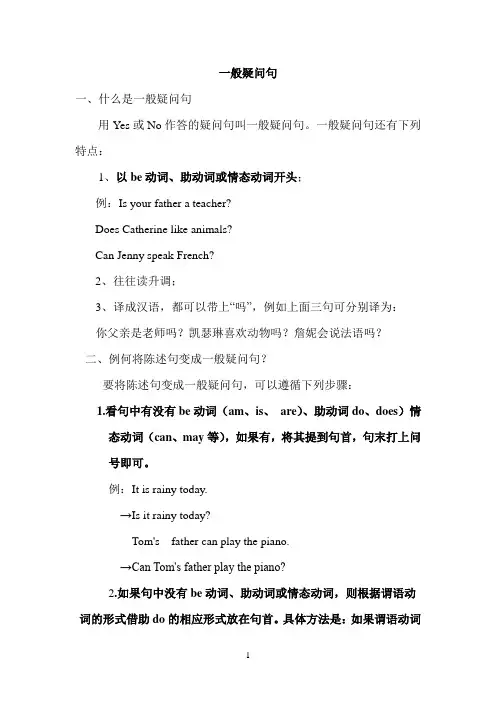
一般疑问句一、什么是一般疑问句用Yes或No作答的疑问句叫一般疑问句。
一般疑问句还有下列特点:1、以be动词、助动词或情态动词开头;例:Is your father a teacher?Does Catherine like animals?Can Jenny speak French?2、往往读升调;3、译成汉语,都可以带上“吗”,例如上面三句可分别译为:你父亲是老师吗?凯瑟琳喜欢动物吗?詹妮会说法语吗?二、例何将陈述句变成一般疑问句?要将陈述句变成一般疑问句,可以遵循下列步骤:1.看句中有没有be动词(am、is、are)、助动词do、does)情态动词(can、may等),如果有,将其提到句首,句末打上问号即可。
例:It is rainy today.→Is it rainy today?Tom's father can play the piano.→Can Tom's father play the piano?2.如果句中没有be动词、助动词或情态动词,则根据谓语动词的形式借助do的相应形式放在句首。
具体方法是:如果谓语动词是原形,则借do;如果谓语动词是一般现在时第三人称单数形式,则借does.记得助动词和情态动词后面接动词原形。
例:They go to school by bike.→Do they go to school by bike?Bill gets up at 6:30 every day.→Does bill get up at 6:30 every day?三.陈述句变一般疑问句应注意的事项陈述句变成一般疑问句除了遵循上述规则以外,还应注意下列几点:1.如果陈述句中有第一人称,则变问句时最好要变为第二人称。
例:I usually have lunch at school.→Do you usually have lunch at school?My father is playing soccer.→Is your father playing soccer?2.如果陈述句中有some, 则变问句时往往要变成any 。
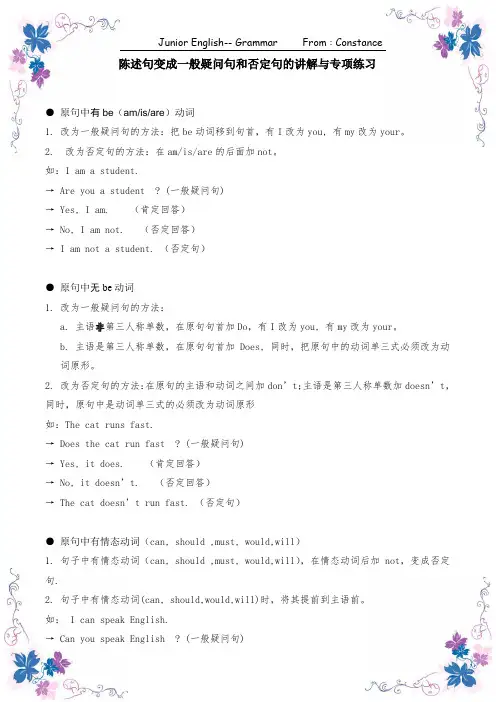
陈述句变成一般疑问句和否定句的讲解与专项练习●原句中有be(am/is/are)动词1.改为一般疑问句的方法:把be动词移到句首,有I改为you, 有my改为your。
2. 改为否定句的方法:在am/is/are的后面加not。
如:I am a student.→ Are you a student ? (一般疑问句)→ Yes, I am. (肯定回答)→ No, I am not. (否定回答)→ I am not a student. (否定句)●原句中无be动词1.改为一般疑问句的方法:a. 主语非第三人称单数,在原句句首加Do,有I改为you, 有my改为your。
b. 主语是第三人称单数,在原句句首加Does, 同时,把原句中的动词单三式必须改为动词原形。
2. 改为否定句的方法:在原句的主语和动词之间加don’t;主语是第三人称单数加doesn’t,同时,原句中是动词单三式的必须改为动词原形如:The cat runs fast.→ Does the cat run fast ? (一般疑问句)→ Yes, it does. (肯定回答)→ No, it doesn’t. (否定回答)→ The cat doesn’t run fast. (否定句)●原句中有情态动词(can, should ,must, would,will)1. 句子中有情态动词(can, should ,must, would,will),在情态动词后加not,变成否定句.2. 句子中有情态动词(can, should,would,will)时,将其提前到主语前。
如: I can speak English.→ Can you speak English ? (一般疑问句)→ Yes, I can. (肯定回答)→ No, I can’t. (否定回答)→ I can’t speak English. (否定句)备注:肯定句中的some在否定句和一般疑问句中应改为any.综合练习题把下列句子改为疑问句并作肯定和否定回答,以及改为否定句。
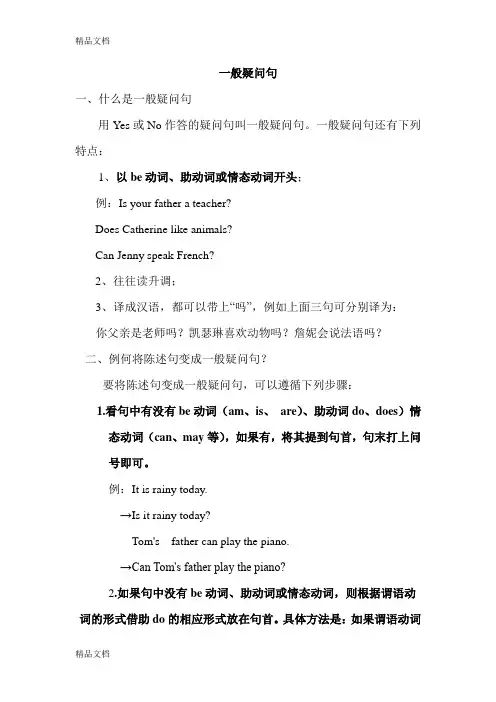
一般疑问句一、什么是一般疑问句用Yes或No作答的疑问句叫一般疑问句。
一般疑问句还有下列特点:1、以be动词、助动词或情态动词开头;例:Is your father a teacher?Does Catherine like animals?Can Jenny speak French?2、往往读升调;3、译成汉语,都可以带上“吗”,例如上面三句可分别译为:你父亲是老师吗?凯瑟琳喜欢动物吗?詹妮会说法语吗?二、例何将陈述句变成一般疑问句?要将陈述句变成一般疑问句,可以遵循下列步骤:1.看句中有没有be动词(am、is、are)、助动词do、does)情态动词(can、may等),如果有,将其提到句首,句末打上问号即可。
例:It is rainy today.→Is it rainy today?Tom's father can play the piano.→Can Tom's father play the piano?2.如果句中没有be动词、助动词或情态动词,则根据谓语动词的形式借助do的相应形式放在句首。
具体方法是:如果谓语动词是原形,则借do;如果谓语动词是一般现在时第三人称单数形式,则借does.记得助动词和情态动词后面接动词原形。
例:They go to school by bike.→Do they go to school by bike?Bill gets up at 6:30 every day.→Does bill get up at 6:30 every day?三.陈述句变一般疑问句应注意的事项陈述句变成一般疑问句除了遵循上述规则以外,还应注意下列几点:1.如果陈述句中有第一人称,则变问句时最好要变为第二人称。
例:I usually have lunch at school.→Do you usually have lunch at school?My father is playing soccer.→Is your father playing soccer?2.如果陈述句中有some, 则变问句时往往要变成any 。
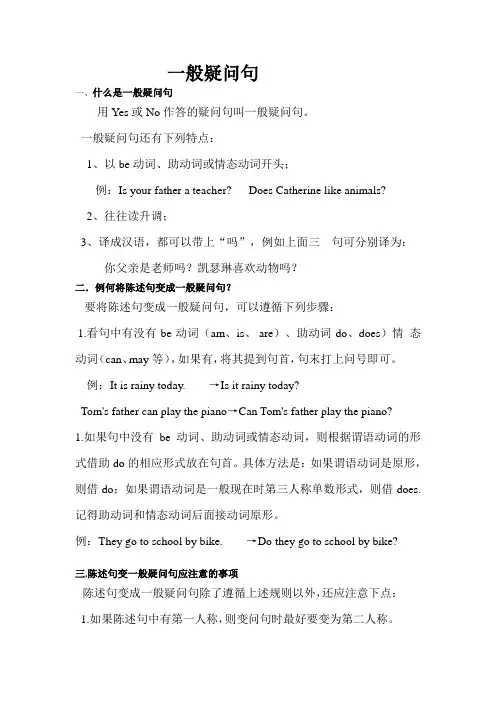
一般疑问句一、什么是一般疑问句用Yes或No作答的疑问句叫一般疑问句。
一般疑问句还有下列特点:1、以be动词、助动词或情态动词开头;例:Is your father a teacher? Does Catherine like animals?2、往往读升调;3、译成汉语,都可以带上“吗”,例如上面三句可分别译为:你父亲是老师吗?凯瑟琳喜欢动物吗?二.例何将陈述句变成一般疑问句?要将陈述句变成一般疑问句,可以遵循下列步骤:1.看句中有没有be动词(am、is、 are)、助动词do、does)情态动词(can、may等),如果有,将其提到句首,句末打上问号即可。
例:It is rainy today. →Is it rainy today?Tom's father can play the piano→Can Tom's father play the piano?1.如果句中没有be动词、助动词或情态动词,则根据谓语动词的形式借助do的相应形式放在句首。
具体方法是:如果谓语动词是原形,则借do;如果谓语动词是一般现在时第三人称单数形式,则借does.记得助动词和情态动词后面接动词原形。
例:They go to school by bike. →Do they go to school by bike?三.陈述句变一般疑问句应注意的事项陈述句变成一般疑问句除了遵循上述规则以外,还应注意下点:1.如果陈述句中有第一人称,则变问句时最好要变为第二人称。
I usually have lunch at school→Do you usually have lunch at school? My father is playing soccer. →Is your father playing soccer?2.如果陈述句中有some, 则变问句时往往要变成any 。
There is some water on the playground. →Is there any water on the playground?四.一般疑问句的回答一般疑问句往往采用简短回答,共由三部分(三个单词)组成,对这三部分(三个单词)的确定可以概括例下:1.第一个词:不是Yes就是No。
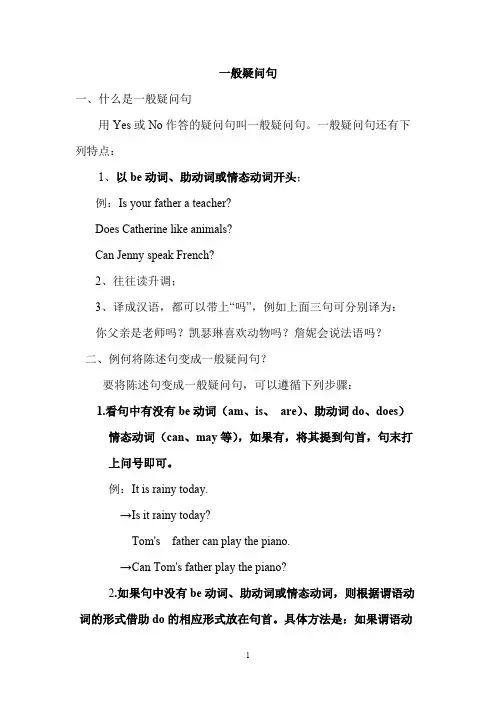
一般疑问句一、什么是一般疑问句用Yes或No作答的疑问句叫一般疑问句。
一般疑问句还有下列特点:1、以be动词、助动词或情态动词开头;例:Is your father a teacher?Does Catherine like animals?Can Jenny speak French?2、往往读升调;3、译成汉语,都可以带上“吗”,例如上面三句可分别译为:你父亲是老师吗?凯瑟琳喜欢动物吗?詹妮会说法语吗?二、例何将陈述句变成一般疑问句?要将陈述句变成一般疑问句,可以遵循下列步骤:1.看句中有没有be动词(am、is、are)、助动词do、does)情态动词(can、may等),如果有,将其提到句首,句末打上问号即可。
例:It is rainy today.→Is it rainy today?Tom's father can play the piano.→Can Tom's father play the piano?2.如果句中没有be动词、助动词或情态动词,则根据谓语动词的形式借助do的相应形式放在句首。
具体方法是:如果谓语动词是原形,则借do;如果谓语动词是一般现在时第三人称单数形式,则借does.记得助动词和情态动词后面接动词原形。
例:They go to school by bike.→Do they go to school by bike?Bill gets up at 6:30 every day.→Does bill get up at 6:30 every day?三.陈述句变一般疑问句应注意的事项陈述句变成一般疑问句除了遵循上述规则以外,还应注意下列几点:1.如果陈述句中有第一人称,则变问句时最好要变为第二人称。
例:I usually have lunch at school.→Do you usually have lunch at school?My father is playing soccer.→Is your father playing soccer?2.如果陈述句中有some, 则变问句时往往要变成any 。
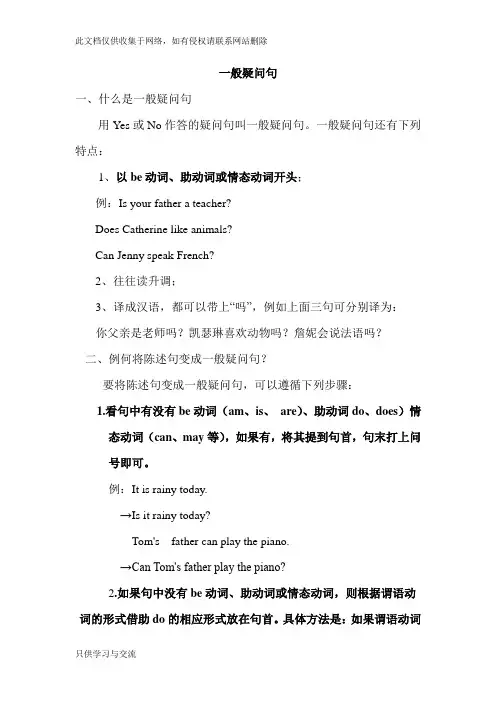
一般疑问句一、什么是一般疑问句用Yes或No作答的疑问句叫一般疑问句。
一般疑问句还有下列特点:1、以be动词、助动词或情态动词开头;例:Is your father a teacher?Does Catherine like animals?Can Jenny speak French?2、往往读升调;3、译成汉语,都可以带上“吗”,例如上面三句可分别译为:你父亲是老师吗?凯瑟琳喜欢动物吗?詹妮会说法语吗?二、例何将陈述句变成一般疑问句?要将陈述句变成一般疑问句,可以遵循下列步骤:1.看句中有没有be动词(am、is、are)、助动词do、does)情态动词(can、may等),如果有,将其提到句首,句末打上问号即可。
例:It is rainy today.→Is it rainy today?Tom's father can play the piano.→Can Tom's father play the piano?2.如果句中没有be动词、助动词或情态动词,则根据谓语动词的形式借助do的相应形式放在句首。
具体方法是:如果谓语动词是原形,则借do;如果谓语动词是一般现在时第三人称单数形式,则借does.记得助动词和情态动词后面接动词原形。
例:They go to school by bike.→Do they go to school by bike?Bill gets up at 6:30 every day.→Does bill get up at 6:30 every day?三.陈述句变一般疑问句应注意的事项陈述句变成一般疑问句除了遵循上述规则以外,还应注意下列几点:1.如果陈述句中有第一人称,则变问句时最好要变为第二人称。
例:I usually have lunch at school.→Do you usually have lunch at school?My father is playing soccer.→Is your father playing soccer?2.如果陈述句中有some, 则变问句时往往要变成any 。
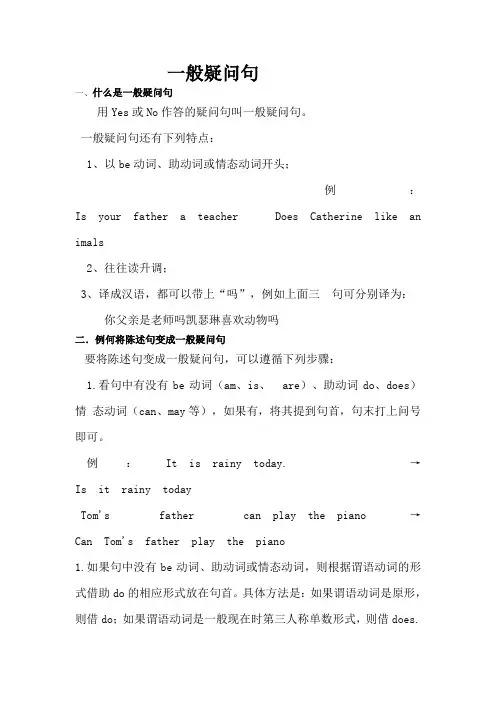
一般疑问句一、什么是一般疑问句用Yes或No作答的疑问句叫一般疑问句。
一般疑问句还有下列特点:1、以be动词、助动词或情态动词开头;例:Is your father a teacher Does Catherine like an imals2、往往读升调;3、译成汉语,都可以带上“吗”,例如上面三句可分别译为:你父亲是老师吗凯瑟琳喜欢动物吗二.例何将陈述句变成一般疑问句要将陈述句变成一般疑问句,可以遵循下列步骤:1.看句中有没有be动词(am、is、are)、助动词do、does)情态动词(can、may等),如果有,将其提到句首,句末打上问号即可。
例:It is rainy today. →Is it rainy todayTom's father can play the piano→Can Tom's father play the piano1.如果句中没有be动词、助动词或情态动词,则根据谓语动词的形式借助do的相应形式放在句首。
具体方法是:如果谓语动词是原形,则借do;如果谓语动词是一般现在时第三人称单数形式,则借does.记得助动词和情态动词后面接动词原形。
例:They go to school by bike. →Do they go to school by bike三.陈述句变一般疑问句应注意的事项陈述句变成一般疑问句除了遵循上述规则以外,还应注意下点:1.如果陈述句中有第一人称,则变问句时最好要变为第二人称。
I usually have lunch at school→Do you usually have lunch at schoolMy father is playing soccer. →Is your father playing soccer2.如果陈述句中有some, 则变问句时往往要变成any 。
There is some water on the playground.→Is there any water on the playground四.一般疑问句的回答一般疑问句往往采用简短回答,共由三部分(三个单词)组成,对这三部分(三个单词)的确定可以概括例下:1.第一个词:不是Yes就是No。
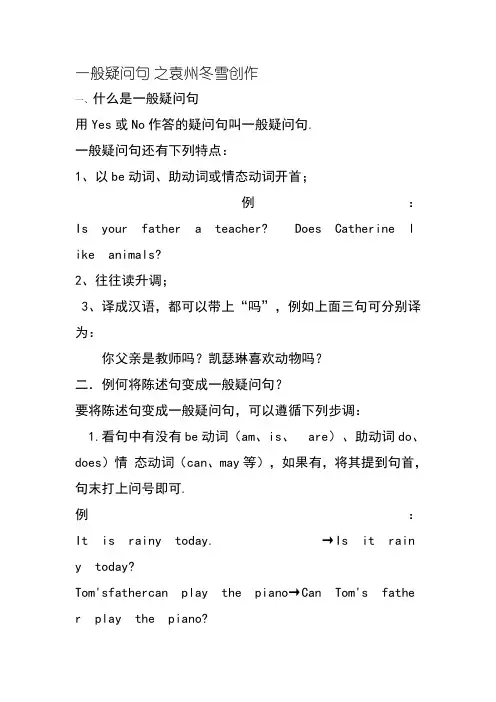
一般疑问句之袁州冬雪创作一、什么是一般疑问句用Yes或No作答的疑问句叫一般疑问句.一般疑问句还有下列特点:1、以be动词、助动词或情态动词开首;例:Is your father a teacher? Does Catherine l ike animals?2、往往读升调;3、译成汉语,都可以带上“吗”,例如上面三句可分别译为:你父亲是教师吗?凯瑟琳喜欢动物吗?二.例何将陈述句变成一般疑问句?要将陈述句变成一般疑问句,可以遵循下列步调:1.看句中有没有be动词(am、is、are)、助动词do、does)情态动词(can、may等),如果有,将其提到句首,句末打上问号即可.例:It is rainy today. →Is it rain y today?Tom'sfathercan play the piano→Can Tom's fathe r play the piano?1.如果句中没有be动词、助动词或情态动词,则根据谓语动词的形式借助do的相应形式放在句首.详细方法是:如果谓语动词是原形,则借do;如果谓语动词是一般现在时第三人称单数形式,则借does.记得助动词和情态动词后面接动词原形.例:They go to school by bike. →Do they go to school by bike?三.陈述句变一般疑问句应注意的事项陈述句变成一般疑问句除了遵循上述规则以外,还应注意下点:1.如果陈述句中有第一人称,则变问句时最好要变成第二人称.I usually have lunch at school→Do you usual ly have lunch at school?My father is playing soccer.→Is your father playing soccer?2.如果陈述句中有some, 则变问句时往往要变成any .There is some water on the playground.→Is there any water on the playgroun d?一般疑问句往往采取简短回答,共由三部分(三个单词)组成,对这三部分(三个单词)的确定可以概括例下:1.第一个词:不是Yes就是No.(有时根据语气的分歧,Yes 可由Sure, Certainly, Of course等代替.NO可由sorry 代替.)2.第二个词:问谁答谁.即答语中的主语须与问句的主语一致(但必须用主格代词).例:Does she clean her room every day? Yes, she does.Is Anna′s father a doctor? No,he isn′t.Are you a student ? Yes, I am .No, I’m not如果主语是this that,回答时用it 代替,如果问句中主语these, those,回答时用they 代替.3.第三个词:用什么问,用什么答.即沿用问句中的引导词.Can Jim play soccer? Yes, he can.Does Mr Bean speak English? Yes, he does.4.用No开首作否定回答时,开首要加上not.因为回答必须是三部分,所以否定回答必须缩写,而必定回答不克不及缩写.Is Lin Lin in Class 3? Yes, she is. / No, she isn′t.或(No, she′s not)操练一、把下面的句子变成一般疑问句并做回答.1.His father is an English teacher.2.These cats are crying.3.He is crying under the tree.4.His birthday is on the twentieth of Novemb er.5.Mrs. Li and Kitty are in a big shop.6.Kitty is wearing her new uniform.二、用适当的词语填空1> _ __ she know all the answers ? Y es , she ____ . No, she _____.2> _____ the twins often fight ? Y es ,____ do. No, _____ don’t.3> _does____ your dad like listening to musi c? Yes ,____ does . No, ____ doesn ’t.4>_____ uncle Tom wash his car everyday?Yes , ____ does . No, ____ doesn’t.5> _____ you have a new teacher? Y es , I ______. No, I ______.6>_____ she a teacher? Yes, she _ ____ . No, she _____.7> ______ you playing ball now? Yes, I __ ____. No, I ______.8> ______ the pig like to sleep? Yes , it ______. No, it _____.9> ______ five birds flying in the sky?Yes, they _____ .No, ____ aren’t.10> _____ your father smoking in the livingroom? Yes, ____ is .No, he _____. 课后小测将下列句子改成一般疑问句并回答.1.It is a lovely dog. __________________ ______________________2.She is a lovely girl. ________________ ________________________3.He is my father. ________________________ _________________4.They are Lily’s cousins. ________________ ___________________5.We are classmates. ________________________ ______________6I am a doctor._________________________________ _______7 There is a bird in the tree. __________ ______________________8. There are many stars in the sky.____________________________9.They are good friends. _______________ _____________________10.I love my parents. ______________________ _________________11.We have a pleasant home. _______________ ___________________12.We like to climb the mountain. ________ ______________________13.They go to church on Sunday. __________ ____________________14.They walk to school every morning. ____ ______________________15.I can swim. _____________________________ _讲堂操练答案一、1.Is his father an English teacher?Yes,he is . No, he isn’t.2.Are those cats crying?Yes,they are. No, theyaren’t.3.Is he crying under the tree? Yes,he is .No, he isn’t.3.Is his birthday on the twentieth of Novembe r? Yes,it is . No, it isn’t.4.Are Mrs. Li and Kitty in a big shop? Ye s,they are. No, they aren’t.5.Is she wearing her new uniform? Yes,she is. No, she isn’t.二.1 Does does does2.Do they they3.3.Does he he4.4. Does he he5.5.Do do do6.6.Is is is7.7. Are am am8.8. Does does does9.9.Are are they10.10. Is he isn’t课后小侧答案1.Is it a lovely dog? Yes,it is . No, itisn’t.2.Is she a lovely girl ? Yes,she is . No , she isn’t.3.Is he your father? Yes,he is . No, he isn’t.4.Are they Lily’s cousins? Yes,they are. N o, they aren’t.5.Are you classmates? Yes,we are. No, we aren’t.6. Are you a doctor? Yes , I am . No, I ’m not.7.Is there a bird in the tree? Yes ,thereis . No, there isn’t.8. Are there many stars in the sky ? Yes,there are . No, there aren’t.9. Are they good friends? Yes,they are. No,they aren’t.10. Do you love your parents? Yes,I do. No,I don’t.11. Do you have a pleasant home? Yes,I do.No,I don’t.12. Do you like to climb the mountain? Yes,I do. No,I don’t.13. Do they go to church on Sunday? Yes ,they do. No,they don’t14.Do they walk to school every morning?Yes,they do. No,they don’t.15.Can you swim? Yes,I can. No, I can’t。
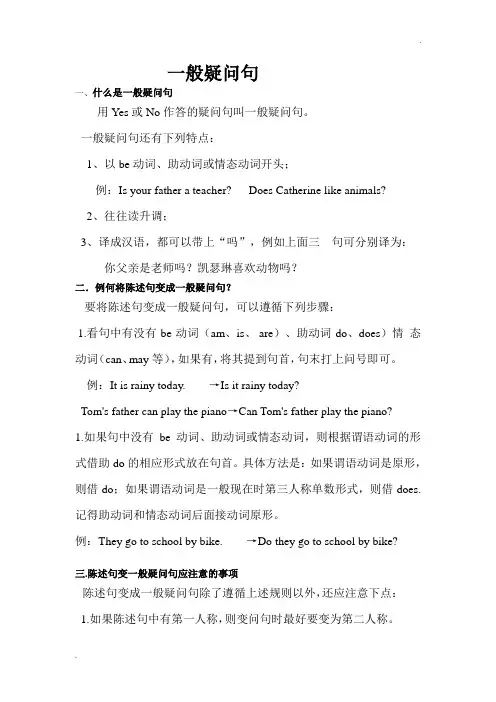
一般疑问句一、什么是一般疑问句用Yes或No作答的疑问句叫一般疑问句。
一般疑问句还有下列特点:1、以be动词、助动词或情态动词开头;例:Is your father a teacher? Does Catherine like animals?2、往往读升调;3、译成汉语,都可以带上“吗”,例如上面三句可分别译为:你父亲是老师吗?凯瑟琳喜欢动物吗?二.例何将陈述句变成一般疑问句?要将陈述句变成一般疑问句,可以遵循下列步骤:1.看句中有没有be动词(am、is、 are)、助动词do、does)情态动词(can、may等),如果有,将其提到句首,句末打上问号即可。
例:It is rainy today. →Is it rainy today?Tom's father can play the piano→Can Tom's father play the piano?1.如果句中没有be动词、助动词或情态动词,则根据谓语动词的形式借助do的相应形式放在句首。
具体方法是:如果谓语动词是原形,则借do;如果谓语动词是一般现在时第三人称单数形式,则借does.记得助动词和情态动词后面接动词原形。
例:They go to school by bike. →Do they go to school by bike?三.陈述句变一般疑问句应注意的事项陈述句变成一般疑问句除了遵循上述规则以外,还应注意下点:1.如果陈述句中有第一人称,则变问句时最好要变为第二人称。
I usually have lunch at school→Do you usually have lunch at school? My father is playing soccer. →Is your father playing soccer?2.如果陈述句中有some, 则变问句时往往要变成any 。
There is some water on the playground. →Is there any water on the playground?四.一般疑问句的回答一般疑问句往往采用简短回答,共由三部分(三个单词)组成,对这三部分(三个单词)的确定可以概括例下:1.第一个词:不是Yes就是No。
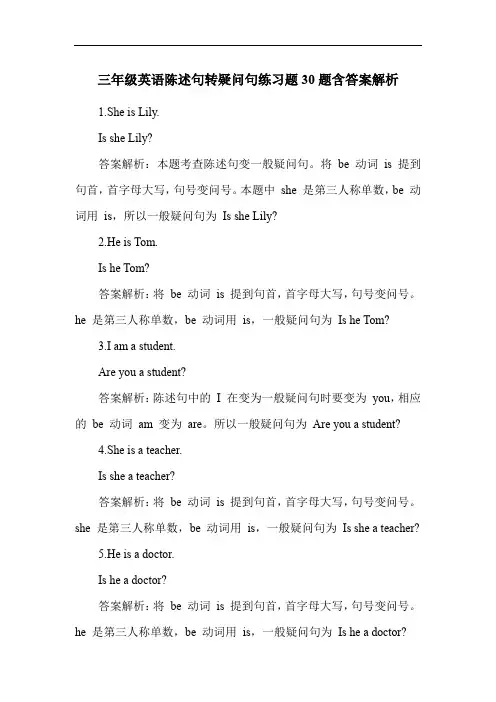
三年级英语陈述句转疑问句练习题30题含答案解析1.She is Lily.Is she Lily?答案解析:本题考查陈述句变一般疑问句。
将be 动词is 提到句首,首字母大写,句号变问号。
本题中she 是第三人称单数,be 动词用is,所以一般疑问句为Is she Lily?2.He is Tom.Is he Tom?答案解析:将be 动词is 提到句首,首字母大写,句号变问号。
he 是第三人称单数,be 动词用is,一般疑问句为Is he Tom?3.I am a student.Are you a student?答案解析:陈述句中的I 在变为一般疑问句时要变为you,相应的be 动词am 变为are。
所以一般疑问句为Are you a student?4.She is a teacher.Is she a teacher?答案解析:将be 动词is 提到句首,首字母大写,句号变问号。
she 是第三人称单数,be 动词用is,一般疑问句为Is she a teacher?5.He is a doctor.Is he a doctor?答案解析:将be 动词is 提到句首,首字母大写,句号变问号。
he 是第三人称单数,be 动词用is,一般疑问句为Is he a doctor?6.They are friends.Are they friends?答案解析:将be 动词are 提到句首,首字母大写,句号变问号。
they 是第三人称复数,be 动词用are,一般疑问句为Are they friends?7.We are classmates.Are we classmates?答案解析:将be 动词are 提到句首,首字母大写,句号变问号。
we 在变为一般疑问句时不变,be 动词用are,一般疑问句为Are we classmates?8.She is beautiful.Is she beautiful?答案解析:将be 动词is 提到句首,首字母大写,句号变问号。
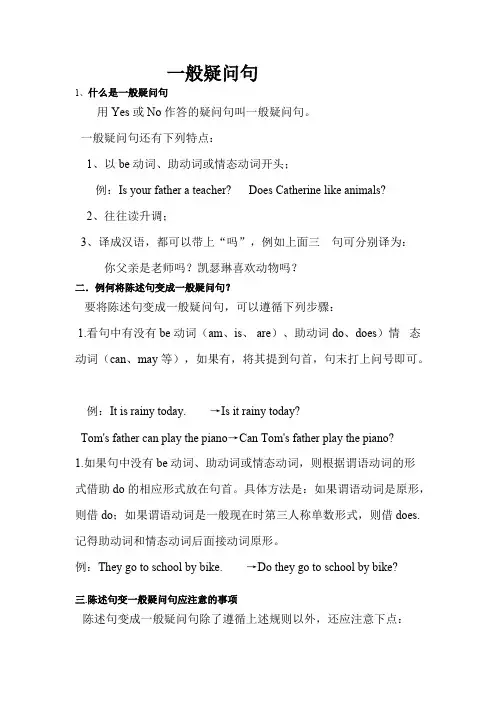
一般疑问句1、什么是一般疑问句用Yes或No作答的疑问句叫一般疑问句。
一般疑问句还有下列特点:1、以be动词、助动词或情态动词开头;例:Is your father a teacher? Does Catherine like animals?2、往往读升调;3、译成汉语,都可以带上“吗”,例如上面三句可分别译为:你父亲是老师吗?凯瑟琳喜欢动物吗?二.例何将陈述句变成一般疑问句?要将陈述句变成一般疑问句,可以遵循下列步骤:1.看句中有没有be动词(am、is、 are)、助动词do、does)情态动词(can、may等),如果有,将其提到句首,句末打上问号即可。
例:It is rainy today. →Is it rainy today?Tom's father can play the piano→Can Tom's father play the piano? 1.如果句中没有be动词、助动词或情态动词,则根据谓语动词的形式借助do的相应形式放在句首。
具体方法是:如果谓语动词是原形,则借do;如果谓语动词是一般现在时第三人称单数形式,则借does.记得助动词和情态动词后面接动词原形。
例:They go to school by bike. →Do they go to school by bike?三.陈述句变一般疑问句应注意的事项陈述句变成一般疑问句除了遵循上述规则以外,还应注意下点:1.如果陈述句中有第一人称,则变问句时最好要变为第二人称。
I usually have lunch at school→Do you usually have lunch at school? My father is playing soccer. →Is your father playing soccer?2.如果陈述句中有some, 则变问句时往往要变成any 。
There is some water on the playground. →Is there any water on the pl ayground?四.一般疑问句的回答一般疑问句往往采用简短回答,共由三部分(三个单词)组成,对这三部分(三个单词)的确定可以概括例下:1.第一个词:不是Yes就是No。
一般疑问句一、什么是一般疑问句用Yes或No作答的疑问句叫一般疑问句。
一般疑问句还有下列特点:1、以be动词、助动词或情态动词开头;例:Is your father a teacher? Does Catherine like a nimals?2、往往读升调;3、译成汉语,都可以带上“吗”,例如上面三句可分别译为:你父亲是老师吗?凯瑟琳喜欢动物吗?二.例何将陈述句变成一般疑问句?要将陈述句变成一般疑问句,可以遵循下列步骤:1.看句中有没有be动词(am、is、are)、助动词do、does)情态动词(can、may等),如果有,将其提到句首,句末打上问号即可。
例:It is rainy today. →Is it rainy today?Tom's father can play the piano→Can Tom's father play the piano?1.如果句中没有be动词、助动词或情态动词,则根据谓语动词的形式借助do的相应形式放在句首。
具体方法是:如果谓语动词是原形,则借do;如果谓语动词是一般现在时第三人称单数形式,则借does.记得助动词和情态动词后面接动词原形。
例:They go to school by bike. →Do they go to school by bike?三.陈述句变一般疑问句应注意的事项陈述句变成一般疑问句除了遵循上述规则以外,还应注意下点:1.如果陈述句中有第一人称,则变问句时最好要变为第二人称。
I usually have lunch at school→Do you usually have lunch at school?My father is playing soccer. →Is your father playing soccer?2.如果陈述句中有some, 则变问句时往往要变成any 。
There is some water on the playground.→Is there any water on the playground?四.一般疑问句的回答一般疑问句往往采用简短回答,共由三部分(三个单词)组成,对这三部分(三个单词)的确定可以概括例下:1.第一个词:不是Yes就是No。
一般疑问句一、什么是一般疑问句用Yes 或No 作答的疑问句叫一般疑问句。
一般疑问句还有下列特点:1、以be 动词、助动词或情态动词开头;例:Is your father a teacher?Does Catherine like animals?Can Jenny speak French?2、往往读升调;3、译成汉语,都可以带上“吗”,例如上面三句可分别译为:你父亲是老师吗?凯瑟琳喜欢动物吗?詹妮会说法语吗?二、例何将陈述句变成一般疑问句?要将陈述句变成一般疑问句,可以遵循下列步骤:1. 看句中有没有be动词(am、is、are)、助动词do、does)情态动词(can、may 等),如果有,将其提到句首,句末打上问号即可。
例:It is rainy today.—Is it rainy today?Tom's father can play the piano.—Can Tom's father play the piano?2•如果句中没有be动词、助动词或情态动词,则根据谓语动词的形式借助do 的相应形式放在句首。
具体方法是:如果谓语动词是原形,则借do ;如果谓语动词是一般现在时第三人称单数形式,则借does.记得助动词和情态动词后面接动词原形。
例:They go to school by bike.—Do they go to school by bike?Bill gets up at 6:30 every day.—Does bill get up at 6:30 every day?三.陈述句变一般疑问句应注意的事项陈述句变成一般疑问句除了遵循上述规则以外,还应注意下列几点:1. 如果陈述句中有第一人称,则变问句时最好要变为第二人称。
例:I usually have lunch at school.—Do you usually have lunch at school?My father is playing soccer.—Is your father playing soccer?2. 如果陈述句中有some, 则变问句时往往要变成any 。
陈述句变一般疑问句讲解练习及答案Company Document number:WTUT-WT88Y-W8BBGB-BWYTT-19998一般疑问句一、什么是一般疑问句用Yes或No作答的疑问句叫一般疑问句。
一般疑问句还有下列特点:1、以be动词、助动词或情态动词开头;例:Isyourfatherateacher DoesCatherinelikeanimals2、往往读升调;3、译成汉语,都可以带上“吗”,例如上面三句可分别译为:你父亲是老师吗凯瑟琳喜欢动物吗二.例何将陈述句变成一般疑问句要将陈述句变成一般疑问句,可以遵循下列步骤:1.看句中有没有be动词(am、is、are)、助动词do、does)情态动词(can、may等),如果有,将其提到句首,句末打上问号即可。
例:Itisrainytoday.→IsitrainytodayTom's father canplaythepiano→CanTom'sfatherplaythepiano1.如果句中没有be动词、助动词或情态动词,则根据谓语动词的形式借助do的相应形式放在句首。
具体方法是:如果谓语动词是原形,则借do;如果谓语动词是一般现在时第三人称单数形式,则借does.记得助动词和情态动词后面接动词原形。
例:Theygotoschoolbybike.→Dotheygotoschoolbybike三.陈述句变一般疑问句应注意的事项陈述句变成一般疑问句除了遵循上述规则以外,还应注意下点:1.如果陈述句中有第一人称,则变问句时最好要变为第二人称。
Iusuallyhavelunchatschool→DoyouusuallyhavelunchatschoolMyfatherisplayingsoccer.→Isyourfatherplayingsoccer2.如果陈述句中有some,则变问句时往往要变成any。
Thereissomewaterontheplayground.→Isthereanywaterontheplayground 四.一般疑问句的回答一般疑问句往往采用简短回答,共由三部分(三个单词)组成,对这三部分(三个单词)的确定可以概括例下:1.第一个词:不是Yes就是No。
陈述句变一般疑问句练习题及答案精品文档陈述句变一般疑问句练习题及答案一、什么是一般疑问句用Yes或No作答的疑问句叫一般疑问句。
一般疑问句还有下列特点: 1、以be动词、助动词或情态动词开头;例:Is your father a teacher?Does Catherine like animals?Can Jenny speak French?2、往往读升调;3、译成汉语,都可以带上“吗”,例如上面三句可分别译为:你父亲是老师吗,凯瑟琳喜欢动物吗,詹妮会说法语吗,二、例何将陈述句变成一般疑问句,要将陈述句变成一般疑问句,可以遵循下列步骤:1.看句中有没有be动词、助动词do、does)情态动词,如果有,将其提到句首,句末打上问号即可。
例:It is rainy today.?Is it rainy today?Tom’s father can play the piano.1 / 14精品文档?Can Tom’s father play the piano?2.如果句中没有be动词、助动词或情态动词,则根据谓语动词的形式借助do的相应形式放在句首。
具体方法是:如果谓语动词是原形,则借do;如果谓语动词是一般现在时第三人称单数形式,则借does.记得助动词和情态动词后面接动词原形。
例:They go to school by bike.?Do they go to school by bike?Bill gets up at:30 every day.?Does bill get up at:30 every day?三.陈述句变一般疑问句应注意的事项陈述句变成一般疑问句除了遵循上述规则以外,还应注意下列几点:1.如果陈述句中有第一人称,则变问句时最好要变为第二人称。
例:I usually have lunch at school.?Do you usually have lunch at school?My father is playing soccer.?Is your father playing soccer?2.如果陈述句中有some, 则变问句时往往要变成any 。
陈述句变一般疑问句练习题及答案精品文档陈述句变一般疑问句练习题及答案一、什么是一般疑问句用Yes或No作答的疑问句叫一般疑问句。
一般疑问句还有下列特点: 1、以be动词、助动词或情态动词开头;例:Is your father a teacher?Does Catherine like animals?Can Jenny speak French?2、往往读升调;3、译成汉语,都可以带上“吗”,例如上面三句可分别译为:你父亲是老师吗,凯瑟琳喜欢动物吗,詹妮会说法语吗,二、例何将陈述句变成一般疑问句,要将陈述句变成一般疑问句,可以遵循下列步骤:1.看句中有没有be动词、助动词do、does)情态动词,如果有,将其提到句首,句末打上问号即可。
例:It is rainy today.?Is it rainy today?Tom’s father can play the piano.1 / 14精品文档?Can Tom’s father play the piano?2.如果句中没有be动词、助动词或情态动词,则根据谓语动词的形式借助do的相应形式放在句首。
具体方法是:如果谓语动词是原形,则借do;如果谓语动词是一般现在时第三人称单数形式,则借does.记得助动词和情态动词后面接动词原形。
例:They go to school by bike.?Do they go to school by bike?Bill gets up at:30 every day.?Does bill get up at:30 every day?三.陈述句变一般疑问句应注意的事项陈述句变成一般疑问句除了遵循上述规则以外,还应注意下列几点:1.如果陈述句中有第一人称,则变问句时最好要变为第二人称。
例:I usually have lunch at school.?Do you usually have lunch at school?My father is playing soccer.?Is your father playing soccer?2.如果陈述句中有some, 则变问句时往往要变成any 。
一般疑问句一、什么是一般疑问句用Yes或No作答的疑问句叫一般疑问句。
一般疑问句还有下列特点:1、以be动词、助动词或情态动词开头;例:Is your father a teacher? Does Catherine like animals?2、往往读升调;3、译成汉语,都可以带上“吗”,例如上面三句可分别译为:你父亲是老师吗?凯瑟琳喜欢动物吗?二.例何将陈述句变成一般疑问句?要将陈述句变成一般疑问句,可以遵循下列步骤:1.看句中有没有be动词(am、is、 are)、助动词do、does)情态动词(can、may等),如果有,将其提到句首,句末打上问号即可。
例:It is rainy today. →Is it rainy today?Tom's father can play the piano→Can Tom's father play the piano?1.如果句中没有be动词、助动词或情态动词,则根据谓语动词的形式借助do的相应形式放在句首。
具体方法是:如果谓语动词是原形,则借do;如果谓语动词是一般现在时第三人称单数形式,则借does.记得助动词和情态动词后面接动词原形。
例:They go to school by bike. →Do they go to school by bike?三.陈述句变一般疑问句应注意的事项陈述句变成一般疑问句除了遵循上述规则以外,还应注意下点:1.如果陈述句中有第一人称,则变问句时最好要变为第二人称。
I usually have lunch at school→Do you usually have lunch at school? My father is playing soccer. →Is your father playing soccer?2.如果陈述句中有some, 则变问句时往往要变成any 。
There is some water on the playground. →Is there any water on the playground?四.一般疑问句的回答一般疑问句往往采用简短回答,共由三部分(三个单词)组成,对这三部分(三个单词)的确定可以概括例下:1.第一个词:不是Yes就是No。
(有时根据语气的不同,Yes可由Sure, Certainly, Of course等代替.NO可由sorry 代替.)2.第二个词:问谁答谁。
即答语中的主语须与问句的主语一致(但必须用主格代词)。
例:Does she clean her room every day? Yes, she does.Is Anna′s father a doctor? No,he isn′t.Are you a student ? Yes, I am .No, I’m not如果主语是 this that,回答时用 it 代替,如果问句中主语these, those,回答时用 they 代替。
3.第三个词:用什么问,用什么答。
即沿用问句中的引导词。
Can Jim play soccer? Yes, he can.Does Mr Bean speak English? Yes, he does.4.用No开头作否定回答时,结尾要加上 not。
因为回答必须是三部分,所以否定回答必须缩写,而肯定回答不能缩写。
Is Lin Lin in Class 3? Yes, she is. / No, she isn′t.或(No, she′s not)练习一、把下面的句子变为一般疑问句并做回答。
1. His father is an English teacher.2.These cats are crying.3.He is crying under the tree.4.His birthday is on the twentieth of November.5.Mrs. Li and Kitty are in a big shop.6.Kitty is wearing her new uniform.二、用适当的词语填空1> _ __ she know all the answers ? Yes , she ____ . No, she _____.2> _____ the twins often fight ? Yes ,____ do. No, _____ don’t.3> _does____ your dad like listening to music? Yes ,____ does . No , ____ doesn’t.4>_____ uncle Tom wash his car everyday? Yes , ____ does . No, _ ___ doesn’t.5> _____ you have a new teacher? Yes , I ______. No, I ______.6>_____ she a teacher? Yes, she _____ . No, she _____.7> ______ you playing ball now? Yes, I ______. No, I ______.8> ______ the pig like to sleep? Yes, it ______. No, it _____.9> ______ five birds flying in the sky? Yes, they _____ .No, ____ ar en’t.10> _____ your father smoking in the living room? Yes, ____ is .No, he _____.课后小测将下列句子改成一般疑问句并回答。
1. It is a lovely dog. ________________________________________2. She is a lovely girl. _______________________________________ _3. He is my father. _________________________________________4. They are Lily’s cousins. ___________________________________5. We are classmates. ______________________________________ 6I am a doctor.________________________________________7 There is a bird in the tree. ________________________________8. There are many stars in the sky. ____________________________9. They are good friends. ____________________________________10. I love my parents. _______________________________________11. We have a pleasant home. _________________________________ _12. We like to climb the mountain. ______________________________13. They go to church on Sunday. ______________________________14. They walk to school every morning. __________________________15. I can swim. ______________________________课堂练习答案一、1.Is his father an English teacher? Yes,he is . No, he isn’t.2.Are those cats crying?Yes,they are. No, they aren’t.3.Is he crying under the tree? Yes,he is . No, he isn’t.3.Is his birthday on the twentieth of November? Yes,it is . No, it isn’t.4.Are Mrs. Li and Kitty in a big shop? Yes,they are. No, they aren’t.5.Is she wearing her new uniform? Yes,she is . No, she isn’t.二.1 Does does does2.Do they they3.3.Does he he4.4. Does he he5.5.Do do do6.6.Is is is7.7. Are am am8.8. Does does does9.9.Are are they10.10. Is he isn’t课后小侧答案1.Is it a lovely dog? Yes,it is . No, it isn’t.2.Is she a lovely girl ? Yes,she is . No, she isn’t.3.Is he your father? Yes,he is . No, he isn’t.4.Are they Lily’s cousins? Yes,they are. No, they aren’t.5.Are you classmates? Yes,we are. No, we aren’t.6. Are you a doctor? Yes , I am . No, I’m not.7.Is there a bird in the tree? Yes ,there is . No, there isn’t.8. Are there many stars in the sky ? Yes ,there are . No, there aren’t.9. Are they good friends? Yes,they are. No, they aren’t.10. Do you love your parents? Yes,I do. No,I don’t. 11. Do you have a pleasant home? Yes,I do. No,I don’t.12. Do you like to climb the mountain? Yes,I do. No,I don’t.13. Do they go to church on Sunday? Yes,they do. No,they don’t14.Do they walk to school every morning? Yes,they do. No,they don’t.。